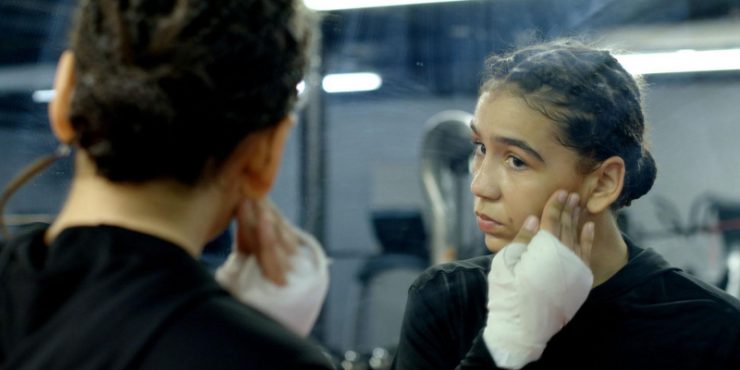If boxing is cinema’s most beloved sport, then director Emily Sheskin utilizes that fact to her advantage in Jesszilla, a new documentary about childhood boxer Jesselyn Silva. Sheskin has been collecting footage with Silva since at least 2017, when she began her tournament career at nine years old. Jesszilla is a movie aware of the boxing narratives woven throughout movie history – everything from the inspirational underdogs in Rocky to the implosive monsters in Raging Bull – and allows the audience to anticipate what Silva’s journey through the ring will be like, good or bad. Being a small girl in a sport dominated by large men, one thinks they know what Silva’s biggest hurdles are going to be, that is until life plays its hand and presents her and her family with a challenge she never could have foreseen.
From New Jersey, Jesselyn lives with her father Pedro and her younger brother, Josiah. Her ability to comport herself with great confidence both in and out of the ring separates her from most competitors in her age bracket. Of course, her skill in such a violent sport also contributes to said confidence. Trained by local gym owner, Don Somerville, Jesselyn has impressive speed and considerable power in such a small, unintimidating package. Just the way she likes it. This makes her a welcome guest on morning shows that love to showcase her charming personality played against the ferocity of her fighting style. As she gets older, her skills become more honed, and soon she’s the #1 ranked fighter in her age and weight class. Her goal? Compete for the US in the 2024 Olympics, something that feels attainable if far from an inevitability.
Jesszilla charts her journey into adolescence, where competition gets stiffer, and coaching gets harsher. As her vision of being an Olympian inches closer, so too does the pressure of competition. Things really get upturned in 2022, when doctors discover a tumor on Jesselyn’s brain stem that requires emergency surgery. Soon after, Jesselyn is diagnosed with a very rare, very aggressive form of brain cancer, that quickly and permanently ends her boxing career. This isn’t discovered until over an hour into the movie, a reveal so shocking and so disheartening that it completely reorients what you’ve seen before. One is reminded of yet another boxing classic, Million Dollar Baby, another film about a fighter who finds quick success only to be physically undone by something totally unexpected.
There are secondary dramas within Jesszilla. Her and Pedro’s relationship with Somerville goes through ups and downs as he occasionally goes through periods of prioritizing his own business pursuits over being Jesselyn’s coach. There is also the mystery of Jesselyn’s mother, whom Pedro insists is “in the picture”, but is never seen. Her absence is alluded to, though never explicitly explained. A moment where Jesselyn shows us a picture of her as a baby in her mother’s arms is the closest we get to catching a glimpse of her. The film addresses the fact that Jesselyn gets asked about her mother a lot – Pedro’s permanent presence only appears to highlight her permanent absence in the media’s eyes – but never goes too far down that road. A glimpse of a domestic drama that’s too difficult to explore.
The film is a definitional showcase of nonfiction filmmaking, on how documentarians have no control over the fates of its subjects. You can only curate the way in which that subject’s story is told. Sheskin has been working with the Silva family for close to a decade, imagining what Jesselyn’s narrative arc would be, only to be driven sideways by the appearance of cancer. For anyone who’s ever had cancer, or known someone who has, you know that this is too often the case. There are times when I wish Jesszilla transcended past a sequence of events; it at times feels like a sequence of short films strung haphazardly together. But Sheskin’s connection to the Silvas is strikingly apparent throughout the entirety of the doc.
Tragically, Jesselyn passed away in the Summer of 2024, the same Summer that hosted the Olympics she was never able to attend. Her life was devastatingly short, but Jesszilla impressively argues the fullness of her life, in moving fashion. The pressure of climbing the mountain of youth boxing pales in comparison for the fight against cancer. The film ends with Jesselyn’s final wish to raise awareness and funds for pediatric brain cancer, and includes a plea to donate for funding of cancer research. It’s a stirring, if thudding, finale, which highlights the horror of her death without turning her into a victim. Jesszilla is about how she built herself into an icon in the youth boxing world, and in the end she was an icon for something much more significant.
Directed by Emily Sheskin










